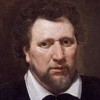Mental pleasures never cloy: unlike those of the body, they are increased by repetition, approved of by reflection, and strengthened by enjoyment.
Charles Caleb "C. C." Colton (1780-1832) English cleric, writer, aphorist
Lacon: Or, Many Things in Few Words, Vol. 1, § 246 (1820)
(Source)
Quotations about:
enjoyment
Note not all quotations have been tagged, so Search may find additional quotes on this topic.
The poor have the same basic pleasures of the rich, and the rich will always resent it.
Mignon McLaughlin (1913-1983) American journalist and author
The Neurotic’s Notebook, ch. 1 (1963)
(Source)
Awl plezzures are lawful that don’t end in making us feel sorry.
[All pleasures are lawful that don’t end in making us feel sorry.]Josh Billings (1818-1885) American humorist, aphorist [pseud. of Henry Wheeler Shaw]
Everybody’s Friend, Or; Josh Billing’s Encyclopedia and Proverbial Philosophy of Wit and Humor, ch. 148 “Affurisms: Ink Brats” (1874)
(Source)
I had a very pleasant evening, however, though you will probably find out that there was no particular reason for it; but I do not think it worth while to wait for enjoyment until there is some real opportunity for it.
So Life’s year begins and closes;
Days, though short’ning, still can shine;
What though youth gave love and roses,
Age still leaves us friends and wine.
Put not oph till to-morrow what can be enjoyed to-day.
[Put not off till tomorrow what can be enjoyed today.]
Josh Billings (1818-1885) American humorist, aphorist [pseud. of Henry Wheeler Shaw]
Everybody’s Friend, Or; Josh Billing’s Encyclopedia and Proverbial Philosophy of Wit and Humor, ch. 148 “Affurisms: Ink Brats” (1874)
(Source)
IMMORALITY. The morality of those who are having a better time.
H. L. Mencken (1880-1956) American writer and journalist [Henry Lewis Mencken]
The Book of Burlesques, “The Jazz Webster” (1920)
(Source)
Variant:
Immorality is the morality of those who are having a better time.
[Chrestomathy, ch. 30 "Sententiae" (1949)]
Since Joys are so uncertain; take Gladness when it comes.
Thomas Fuller (1654-1734) English physician, preacher, aphorist, writer
Introductio ad Prudentiam, Vol. 1, # 101 (1725)
(Source)
Do not, on a rainy day, ask your child what he feels like doing, because I assure you that what he feels like doing, you won’t feel like watching.
No play is rubbish if it pleases and if it takes money at the door.
You can’t have a picnic lunch unless the party carrying the basket comes.
All that [experience] really demonstrated was that our future would be the same as our past, and that the sin we had done once, and with loathing, we would do many times, and with joy.
Oscar Wilde (1854-1900) Irish poet, wit, dramatist
The Picture of Dorian Gray, ch. 4 (1891)
(Source)
The passage also occurs in ch. 3 of the original Lippincott's Monthly Magazine (1890-06) version.
As extracted into Oscariana and epigram form (e.g.), it is given in the present tense:
All that it really demonstrates is that our future will be the same as our past, and that the sin we have done once, and with loathing, we shall do many times, and with joy.
That man is the richest whose pleasures are cheapest.
How little it takes to make life perfect! A good sauce, a cocktail after a hard day, a girl who kisses with her mouth half open!
H. L. Mencken (1880-1956) American writer and journalist [Henry Lewis Mencken]
A Little Book in C Major, ch. 4, § 21 (1916)
(Source)
There is no sweeter pleasure than to surprise a man by giving him more than he expected.
[Il n’est pas de plaisir plus doux que de surprendre un homme en lui donnant plus qu’il n’espère.]
Charles Baudelaire (1821-1867) French poet, essayist, art critic
Le Spleen de Paris (Petits Poèmes en Prose), No. 28 “The Counterfeit Money [La Fausse Monnaie]” (1869) [tr. Shipley (1919)]
(Source)
(Source (French)). Alternate translations:
There is no sweeter pleasure than to surprise a man by giving him more than he expects.
[tr. Varèse (1970)]
There is no sweeter pleasure than surprising a man by giving him more than he hopes for.
[tr. Kaplan (1989)]
[T]here is a vast difference between games and play. Play is played for fun, but games are deadly serious, and you do not play them to enjoy yourself.
Maurice Baring (1874-1945) English man of letters, writer, essayist, translator
The Puppet Show of Memory, ch. 5 “School” (1922)
(Source)
The more the pleasures of the body fade away, the greater to me is the pleasure and charm of conversation.
Plato (c.428-347 BC) Greek philosopher
The Republic [Πολιτεία], Book 1 (c. 375 BC) [tr. Jowett (1871)]
(Source)
Socrates recounting something said to him by Cephalus.
And why carry out one’s projects, since the project is sufficient pleasure in itself?
[Et à quoi bon exécuter des projets, puisque le projet est en lui-même une jouissance suffisante?]
Charles Baudelaire (1821-1867) French poet, essayist, art critic
Le Spleen de Paris (Petits Poèmes en Prose), No. 24 “Projects [Les Projets],” final words (1869) [tr. Varèse (1970)]
(Source)
(Source (French)). Alternate translations:
And what is the good of carrying out a project, when the project itself gives me pleasure enough?
[tr. Hamburger (1946)]
And what good is it to carry out plans, since planning itself is a sufficient delight?
[tr. Kaplan (1989)]
And what good would it do to execute such plans, since planning is in itself sufficient enjoyment?
[tr. Waldrop (2009)]
What good is it to accomplish projects, when the project itself is enjoyment enough?
[Various]
I am afraid that the pleasantness of an employment does not always evince its propriety.
Moderation. Small helpings. Sample a little bit of everything. These are the secrets of happiness and good health. You need to enjoy the good things in life, but you need not overindulge.
Julia Child (1912-2004) American chef and writer
“What I’ve Learned,” interview by MIke Sager, Esquire (2001-06)
(Source)
One cannot have too large a party. A large party secures its own amusement.
They that love Mirth, let them heartily Drink,
‘Tis the only Receipt to make Sorrow sink.Ben Jonson (1572-1637) English playwright and poet
“Private Entertainment of the King and Queen,” Highgate, London (1604-05-01)
(Source)
Receipt and recipe (both from the Latin recipe "you take this!") were originally used in English for medical formulations and prescriptions. "Receipt" was often abbreviated "Rt," which, as a ligature, looks like "℞" or "Rx" -- which is still used as an abbreviation a medical prescription.
Money is a singular thing. It ranks with love as man’s greatest source of joy. And with death as his greatest source of anxiety.
John Kenneth Galbraith (1908-2006) Canadian-American economist, diplomat, author
The Age of Anxiety, ch. 6 “The Rise and Fall of Money” (1977)
(Source)
You are the sun who heals all clouded sight.
Solving my doubts, you bring me such content
That doubt, no less than knowing, is delight.[O sol che sani ogne vista turbata,
tu mi contenti sì quando tu solvi,
che, non men che saver, dubbiar m’aggrata.]Dante Alighieri (1265-1321) Italian poet
The Divine Comedy [Divina Commedia], Book 1 “Inferno,” Canto 11, l. 91ff (11.91-93) [Dante] (1309) [tr. Kirkpatrick (2006)]
(Source)
Flattering Virgil before he asks another question. (Source (Italian)). Alternate translations:
O you, who like the Sun each weaken'd sight
Relieve, and give such pleasure when you clear
My doubts, that I to raise them oft desire.
[tr. Rogers (1782), l. 89ff]
Can I repent my doubts! illumin'd Bard,
When thus thy heav'nly words my doubts reward?
[tr. Boyd (1802), st. 14]
O Sun! who healest all imperfect sight,
Thou so content’st me, when thou solv’st my doubt,
That ignorance not less than knowledge charms.
[tr. Cary (1814)]
O Sun, that healest every troubled sight!
So full content, thou solving, doth ensue,
Glads me no less to doubt, than judge aright.
[tr. Dayman (1843)]
O Sun! who healest all troubled vision, thou makest so glad when thou resolvest me, that to doubt is not less grateful than to know.
[tr. Carlyle (1849)]
Thou sun, that clearest every clouded sight,
You so content me to dissolve the knot,
To know is scarce so pleasing as to doubt.
[tr. Bannerman (1850)]
Oh, sun! thou healer of the troubled sight,
What thou declarest makes me so content,
That as in knowledge I rejoice in doubt.
[tr. Johnston (1867)]
O Sun, that healest all distempered vision,
Thou dost content me so, when thou resolvest,
That doubting pleases me no less than knowing!
[tr. Longfellow (1867)]
O Sun that healest every troubled sight, so dost thou content me when thou solvest, that doubting gives me no less pleasure than knowing.
[tr. Butler (1885)]
O Sun, that healest every troubled sight.
Thou so contentest me when thou mak'st clear
Doubts, that no less than knowledge they delight.
[tr. Minchin (1885)]
O Sun that healest every troubled vision, thou dost content me so, when thou explainest, that doubt, not less than knowledge, pleaseth me.
[tr. Norton (1892)]
O sun, that bringest healing unto all clouded vision, thou grantest unto me such satisfaction in thine unravelling, that doubting doth delight me.
[tr. Sullivan (1893)]
Oh! sun, who makest whole all troubled vision.
Thou dost content me so when thou resolvest
That doubt is joy to me, no less than knowledge.
[tr. Griffith (1908)]
O Sun that healest all troubled sight, so dost thou satisfy me with the resolving of my doubts that it is no less grateful to me to question than to know.
[tr. Sinclair (1939)]
O Sun, who heal'st all troubled vision, and so
Contentest me where thou doest certify,
That to doubt pleaseth not less than to know ....
[tr. Binyon (1943)]
O Sun that healest all dim sight, thou so
Doest charm me in resolving of my doubt,
To be perplexed is pleasant as to know.
[tr. Sayers (1949)]
O sun which clears all mists from troubled sight,
such joy attends your rising that I feel
as grateful to the dark as to the light.
[tr. Ciardi (1954)]
O sun that heal every troubled vision, you do content me so, when you solve, that questioning, no less than knowing, pleases me.
[tr. Singleton (1970)]
O sun that shines to clear a misty vision,
such joy is mine when you resolve my doubts
that doubting pleases me no less than knowing!
[tr. Musa (1971)]
O sun that heals all sight that is perplexed,
when I ask you, your answer so contents
that doubting pleases me as much as knowing.
[tr. Mandelbaum (1980)]
O sun who clears every obscure perception
You give such satisfaction when you enlighten me
That, not less than knowledge, doubt is agreeable.
[tr. Sisson (1981)]
O sun, that makes all troubled vision clear,
You give solutions I am so contented with
That asking, no less than knowing, pleases me.
[tr. Pinsky (1994), l. 87ff]
O sun that heals every clouded sight, you content me so when you resolve questions, that doubting is no less pleasurable than knowing.
[tr. Durling (1996)]
O Sun, that heals all troubled sight, you make me so content when you explain to me, that to question is as delightful as to know.
[tr. Kline (2002)]
O sun, you who heal all troubled sight,
you so content me by resolving doubts
it pleases me no less to question than to know.
[tr. Hollander/Hollander (2007)]
O shining sun, healer of troubled vision,
I'm satisfied so well, my mind so settled,
That knowledge pleases me no more than asking questions!
[tr. Raffel (2010)]
"Bright sun," I said, you calm these doubts of mine
As you heal any troubled sight. Such ease
You bring me that to question pleases me
Like being answered."
[tr. James (2013)]
I’m awfully sorry for people who are taken in by all of today’s dietary mumbo jumbo. They are not getting any enjoyment out of their food.
It is written that the last enemy to be vanquished is death. We should begin early in life to vanquish this enemy by obliterating every trace of the fear of death from our minds. Then can we turn to life and fill the whole horizon of our souls with it, turn with added zest to all the serious tasks which it imposes and to the pure delights which here and there it affords.
Felix Adler (1851-1933) German-American educator
Life and Destiny, Lecture 8 “Suffering and Consolation” (1903)
(Source)
When we are children we seldom think of the future. This innocence leaves us free to enjoy ourselves as few adults can. The day we fret about the future is the day we leave our childhood behind.
Patrick Rothfuss (b. 1973) American author
The Name of the Wind, ch. 12 “Puzzle Pieces Fitting” (2007)
(Source)
All the higher animals have methods of expressing pleasure, but human beings alone express pleasure when they do not feel it. This is called politeness and is reckoned among the virtues.
Bertrand Russell (1872-1970) English mathematician and philosopher
“On smiling,” New York American (1932-08-17)
(Source)
The reason some parents really enjoy their children is that they take the time to live with them.
Marcelene Cox (1900-1998) American writer, columnist, aphorist
“Ask Any Woman” column, Ladies’ Home Journal (1946-04)
(Source)
We should laugh before being happy, for fear of dying without having laughed.
[Il faut rire avant que d’être heureux, de peur de mourir sans avoir ri.]
Jean de La Bruyère (1645-1696) French essayist, moralist
The Characters [Les Caractères], ch. 4 “Of the Heart [Du Coeur],” § 63 (4.63) (1688) [tr. Stewart (1970)]
(Source)
(Source (French)). Alternate translations:
We must laugh before we are happy, or else we may die before we have cause to laugh.
[Bullord ed. (1696)]
We must laugh before we are happy, for fear we die before we laugh at all.
[Curll ed. (1713)]
We must laugh before we are happy, or else we may die before we ever laugh at all.
[Browne ed. (1752)]
We must laugh before we are happy, or else we may die before ever having laughed at all.
[tr. Van Laun (1885)]
We must laugh before we are happy, for fear of dying before we have laughed.
[tr. Lee (1903), "Brief Reflections on Men and Things"]
It is generally admitted that most grown-up people, however regrettably, will try to have a good time.
Bertrand Russell (1872-1970) English mathematician and philosopher
“Who May Use Lipstick?” New York American (1931-09-14)
(Source)
Many pleasant things are better when they belong to someone else. You can enjoy them more that way. The first day, pleasure belongs to the owner; after that, to others. When things belong to others, we enjoy them twice as much, without the risk of losing them, and with the pleasure of novelty. Everything tastes better when we are deprived of it.
[Muchas cosas de gusto no se han de poseer en propiedad. Más se goza de ellas ajenas que propias. El primer día es lo bueno para su dueño, los demás para los extraños. Gózanse las cosas ajenas con doblada fruición, esto es, sin el riesgo del daño y con el gusto de la novedad. Sabe todo mejor a privación.]
Baltasar Gracián y Morales (1601-1658) Spanish Jesuit priest, writer, philosopher
The Art of Worldly Wisdom [Oráculo Manual y Arte de Prudencia], § 264 (1647) [tr. Maurer (1992)]
(Source)
(Source (Spanish)). Alternate translations:
Many things that serve for pleasure, ought not to be peculiar. One enjoys more of what is another's, than of what belongs to himself. The first day is for the Master, and all the rest for Strangers. One doubly enjoys what belongs to others, that's to say, not only without fear of loss, but also with the pleasure of Novelty. Privation makes every thing better.
[Flesher ed. (1685), §263]
Many things of Taste one should not possess oneself. One enjoys them better if another's than if one's own. The owner has the good of them the first day, for all the rest of the time they are for others. You take a double enjoyment in other men's property, being without fear of spoiling it and with the pleasure of novelty. Everything tastes better for having been without it.
[tr. Jacobs (1892)]
Many of the things that bring delight should not be owned. They are more enjoyed if another's, than if yours; the first day they give pleasure to the owner, but in all the rest to the others: what belongs to another rejoices doubly, because without the risk of going stale, and with the satisfaction of freshness; everything tastes better after fasting.
[tr. Fischer (1937)]
It’s like this: if you have one piece of cake, and you eat it, that’s fine. If you have two pieces of cake, you should probably share some with a friend. But maybe not. Occasionally we could all use two pieces of cake. But if you have a whole cake, and you eat all of it, that’s not very cool. It’s not just selfish, it’s kinda sick and unhealthy.
Patrick Rothfuss (b. 1973) American author
“Concerning Cake, Bilbo Baggins and Charity,” Blog Entry (19 Jan 2014)
(Source)
I don’t enjoy any of the process of writing. I enjoy it when it goes on if it zings and it has great warmth and import and it’s successful. Yeah, that’s when I enjoy it. But during the desperate, tough time of creating it, there’s not much I enjoy about it. It tires me and lays me out, which is sort of the way I feel now. Tired.
Rod Serling (1924-1975) American screenwriter, playwright, television producer, narrator
“Rod Serling: The Facts of Life,” interview by Linda Brevelle (4 Mar 1975)
(Source)
The interview was held less than four months before his death from cancer.
Such is the life of man, nor wholly blest,
Nor wholly wretched; on her votaries Fortune
now smiles, then frowns. Since our prosperity
Is thus unstable, is not an exemption
From grief the greatest pleasure life can yield?[τοιόσδε ϑνητῶν τῶν ταλαιπώρων βίος’
οὔτ᾽ εὐτυχεῖ τὸ πάμπαν οὔτε δυστυχεῖ,
εὐδαιμονεῖ δὲ καύϑις οὐκ εὐδαιμονεῖ.
τί δῆτ᾽ ἐν ὄλβω μὴ σαφεῖ βεβηκότες
οὐ ξῶμεν ὡς ἥδιστα μὴ λυπούμενοι;]Euripides (485?-406? BC) Greek tragic dramatist
Antiope [Αντιοπη], frag. 196 (TGF, Kannicht) (c. 410 BC) (Amphion?) [tr. Wodhall (1809)]
(Source)
(Source (Greek)). Alternate translation:
Such is the life of wretched mortals;
a man is neither wholly fortunate nor unfortunate;
why then, on entering prosperity which may be insecure,
do we not live as pleasantly as possible, without distress?
[Source]
Such it is, the life of miserable mortals:
neither wholly fortunate nor unfortunate.
He is prosperous and then he is not prosperous.
Why then, when we stand in uncertain happiness,
do we not live as pleasurably as possible, without distress.
[tr. Will (2015)]
No pleasure has any taste for me when not shared with another: no happy thought occurs to me without my being irritated at bringing it forth alone with no one to offer it to.
[Nul plaisir n’a saveur pour moy sans communication. Il ne me vient pas seulement une gaillarde pensée en l’ame, qu’il ne me fasche de l’avoir produite seul, et n’ayant à qui l’offrir.]
Michel de Montaigne (1533-1592) French essayist
Essays, Book 3, ch. 9 “Of Vanity [De la vanité]” (c. 1587) (3.9) (1595) [tr. Screech (1987)]
(Source)
First appeared in the 1588 edition.
(Source (French)). Alternate translations:
With me no pleasure is fully delightsome without communication and no delight absolute except imparted. I doe not so much as apprehend one rare conceipt, or conceive one excellent good thought in my minde, but me thinks I am much grieved and grievously perplexed to have produced the same alone and that I have no sympathizing companion to impart it unto.
[tr. Florio (1603)]
There can be no Pleasure to me without Communication. There is not so much as a spritely Thought comes into my Mind, that it does not grieve me to have produc'd alone, and that I have no one to communicate it unto.
[tr. Cotton (1686)]
There can be no pleasure to me without communication: there is not so much as a sprightly thought comes into my mind, that it does not grieve me to have produced alone, and that I have no one to communicate it to.
[tr. Cotton/Hazlitt (1877)]
No pleasure has any savour for me without imparting it; not even a lively thought comes into my mind that I am not vexed at expressing it when alone and at having no one to offer it to.
[tr. Ives (1925)]
No pleasure has any savor for me without communication. Not even a merry thought comes to my mind without my being vexed at having produced it alone without anyone to offer it to.
[tr. Frame (1943)]
If you cannot enjoy reading a book over and over again, there is no use reading it at all.
Life often begins after dark, and I’ve found too much of a good thing can be wonderful.
Mae West (1892-1980) American film actress
Goodness Had Nothing To Do With It, ch. 21 (1959)
(Source)
Of course, there are those who don’t eat lamb chops, for moral reasons. There are also those who rise before daybreak and leap into a cold shower in February; those hwo disapprove of idleness, gin rummy, slang, dancing, unauthorized sex, naps, socialism, and Jacuzzis for moral reasons. They enjoy it; moral indignation is a pleasure, often the only pleasure, in many lives. It’s also one of the few pleasures people feel obliged to force on other people.
The chief aim of education is to show you, after you make a livelihood, how to enjoy living; and you can live longest and best and most rewardingly by attaining and preserving the happiness of learning.
Gilbert Highet (1906-1978) Scottish-American classicist, academic writer, intellectual critic, literary historian
The Immortal Profession: The Joys of Teaching and Learning (1976)
(Source)
It is good for a professional to be reminded that his professionalism is only a husk, that the real person must remain an amateur, a lover of the work.
May Sarton (1912-1995) Belgian-American poet, novelist, memoirist [pen name of Eleanore Marie Sarton]
Journal of a Solitude, ch. 11 (1973)
(Source)
Men write history for the same reason they write poetry, study the properties of numbers, or play football — for the joy of creation; men read history for the same reason they listen to music or watch cricket — for the joy of appreciation.
A. J. P. Taylor (1906-1990) British historian, journalist, broadcaster [Alan John Percivale Taylor]
“The Historian,” Manchester Guardian (5 Aug 1938)
(Source)
We two will keep to the shelter here, eat and drink
and take some joy in each other’s heartbreaking sorrows,
sharing each other’s memories. Over the years, you know,
a man finds solace even in old sorrows, true, a man
who’s weathered many blows and wandered many miles.[νῶϊ δ᾽ ἐνὶ κλισίῃ πίνοντέ τε δαινυμένω τε
κήδεσιν ἀλλήλων τερπώμεθα λευγαλέοισι,
400μνωομένω: μετὰ γάρ τε καὶ ἄλγεσι τέρπεται ἀνήρ,
ὅς τις δὴ μάλα πολλὰ πάθῃ καὶ πόλλ᾽ ἐπαληθῇ.]Homer (fl. 7th-8th C. BC) Greek author
The Odyssey [Ὀδύσσεια], Book 15, l. 397ff (15.397) [Eumæus] (c. 700 BC) [tr. Fagles (1996)]
(Source)
(Source (Greek)). Alternate translations:
We two, still in our tabernacle here
Drinking and eating, will our bosoms cheer
With memories and tales of our annoys.
Betwixt his sorrows ev’ry human joys,
He most, who most hath felt and furthest err’d.
[tr. Chapman (1616)]
Meanwhile let us sit here, and drink and chat,
And stories of our sad adventures tell;
For much contentment there is ev’n in that,
To them that suffer’d have and come off well.
[tr. Hobbes (1675), l. 357ff]
Here let us feast, and to the feast be joined
Discourse, the sweeter banquet of the mind;
Review the series of our lives, and taste
The melancholy joy of evils passed:
For he who much has suffered, much will know,
And pleased remembrance builds delight on woe.
[tr. Pope (1725)]
But we with wine and a well-furnish’d board
Supplied, will solace mutually derive
From recollection of our sufferings past;
For who hath much endured, and wander’d far,
Finds the recital ev’n of sorrow sweet.
[tr. Cowper (1792), l. 483ff]
But we two, drinking wine and eating bread,
Will charm our dear hearts each with other's pain.
Past sorrow, and the tears a man hath shed,
Who far hath wandered over earth and main,
Yield comfort.
[tr. Worsley (1861), st. 55]
Let us, meanwhile,
Within this hut potations free enjoy,
And to our full contentment eat, while each
The mem'ry wakens of his own past griefs;
For, let but time enough elapse, the man
Who has sharp trials brook'd, and through the world
A wand'rer rov'd, will on his by-gone woe
Exulting dwell.
[tr. Musgrave (1869), l. 651ff]
We two in the hut a' drinking and a' feasting,
We'll soothe each other with our doleful cares
Recounting them! for even sorrows bring
An after pleasure to the wight, I ween, --
His many woes and many wandrings past.
[tr. Bigge-Wither (1869)]
But let us twain drink and feast within the steading, and each in his neighbour’s sorrows take delight, recalling them, for even the memory of griefs is a joy to a man who hath been sore tried and wandered far.
[tr. Butcher/Lang (1879)]
But here in the booth we twain at the drink and the banqueting
Shall be merry with the memory of each other's weary woe.
For very grief shall gladden the man that to and fro
Hath wandered wide the world, and suffered sorrow sore.
[tr. Morris (1887)]
But let us drink and feast within the lodge, and please ourselves with telling one another tales of piteous ill; for afterwards a man finds pleasure in his pains, when he has suffered logn and wandered long.
[tr. Palmer (1891)]
We too will sit here eating and drinking in the hut, and telling one another stories about our misfortunes; for when a man has suffered much, and been buffeted about in the world, he takes pleasure in recalling the memory of sorrows that have long gone by.
[tr. Butler (1898)]
But we two will drink and feast in the hut, and will take delight each in the other's grievous woes, as we recall them to mind. For in after time a man finds joy even in woes, whosoever has suffered much, and wandered much.
[tr. Murray (1919)]
But we two snugly indoors here may drink and eat and revel in an interchange of sorrows-- sorrows that are memories, I mean; for when a man has endured deeply and strayed far from home he can cull solace from the rehearsal of old griefs.
[tr. Lawrence (1932)]
Meanwhile let us two, here in the hut, over our food and wine, regale ourselves with the unhappy memories that each can recall. For a man who has been through bitter experiences and travelled far can enjoy even his sufferings after a time.
[tr. Rieu (1946)]
Here's a tight roof; we'll drink on, you and I, and ease our hearts of hardships we remember, sharing old times. In later days a man can find a charm in old adversity, exile and pain.
[tr. Fitzgerald (1961)]
But we two, sitting here in the shelter, eating and drinking,
shall entertain each other remembering and retelling
our sad sorrows. For afterwards a man who has suffered
much and wandered much has pleasure out of his sorrows.
[tr. Lattimore (1965)]
Meanwhile let us two have the satisfaction of sharing our unhappy memories over our food and wine here in the hut. For a man who has been through bitter experiences and travelled far enjoys even his sufferings after a time.
[tr. DCH Rieu (2002)]
We two will have our food and drink here in the hut and find pleasure in each other's sad troubles, as we call them to mind; for it is man's way to get enjoyment even from affliction, after the event, if he is a man who has suffered much and roamed far.
[tr. Verity (2016)]
Now let us dine and drink in my home
And take pleasure while we recall to one another
Our grievous pains. For a man may take pleasure even in pain,
Later, when he has suffered and come through so many things.
[tr. @sentantiq (2016)]
But let us, you and I, sit in my cottage over food and wine, and take some joy in hearing how much pain we each have suffered. After many years of agony and absence from one's home, a person can begin enjoying grief.
[tr. Wilson (2017)]
But we two will drink and feast in the hut, and enjoy hearing about each other's wretched misfortunes as we recall them. A man looking back can find pleasure even in grief, one who's suffered and wandered much.
[tr. Green (2018)]
But we two will drink and enjoy each other's sad stories.
[tr. Green (2018), summary version]
We two will drink and feast here in the hut
and enjoy each other’s wretched troubles,
as we recall them. For once they’re over,
a man who’s done a lot of wandering
and suffered much gets pleasure from his woes.
[tr. Johnston (2019), l. 509ff]
As we two drink and dine in this shelter
Let us take pleasure as we recall one another’s terrible pains.
For a man finds pleasure even in pains later on
After he has suffered so very many and survived many too.
[tr. @sentantiq [Joel] (2019)]
Let us take pleasure in calling to mind each other’s terrible pains
while we drink and dine in my home.
For someone may even find pleasure among pains
when they have suffered many and gone through much.
[tr. @sentantiq (2020)]
People who love to eat are always the best people.
Julia Child (1912-2004) American chef and writer
(Attributed)
(Source)
Quoted in and title of a 2020 book of Child quotations, collected by the Julia Child Foundation for Gastronomy. Further source unknown.
No evil dooms us hopelessly except the evil we love, and desire to continue in, and make no effort to escape from.
George Eliot (1819-1880) English novelist [pseud. of Mary Ann Evans]
Daniel Deronda, Book 5, ch. 8 (1876)
(Source)
The essence of all art is to have pleasure in giving pleasure.
Mikhail Baryshnikov (b. 1948) Latvian-American dancer, choreographer, actor
“Baryshnikov: Gotta Dance,” Time (19 May 1975)
(Source)
Wise is he who instead of grieving over what he lacks delights in what he has.
[Εὐγνώμων ὁ μὴ λυπεόμενος ἐφ’ οἷσιν οὐκ ἔχει, ἀλλὰ χαίρων ἐφ’ οἷσιν ἔχει.]
Democritus (c. 460 BC - c. 370 BC) Greek philosopher
Frag. 231 (Diels) [tr. @sententiq (2016)]
(Source)
Original Greek. Diels citation "231 (61 N.)"; collected in Joannes Stobaeus (Stobaios) Anthologium III, 17, 25. Bakewell lists this under "The Golden Sayings of Democritus." Freeman notes this as one of the Gnômae, from a collection called "Maxims of Democratês," but because Stobaeus quotes many of these as "Maxims of Democritus," they are generally attributed to the latter. Alternate translations:
- "A sensible man takes pleasure in what he has instead of pining for what he has not." [tr. Bakewell (1907)]
- "The right-minded man is he who is not grieved by what he has not, but enjoys what he has." [tr. Freeman (1948)]
- "A man of sound judgement is not grieved by what he does not possess but rejoices in what he does possess." [tr. Barnes (1987)]
- "A sensible man does not grieve for what he has not, but enjoys what he has." [Source]
Something Vimes had learned as a young guard drifted up from memory. If you have to look along the shaft of an arrow from the wrong end, if a man has you entirely at his mercy, then hope like hell that man is an evil man. Because the evil like power, power over people, and they want to see you in fear. They want you to know you’re going to die. So they’ll talk. They’ll gloat.
They’ll watch you squirm. They’ll put off the moment of murder like another man will put off a good cigar.
So hope like hell your captor is an evil man. A good man will kill you with hardly a word.
I don’t know whether my life has been a success or a failure But not having any anxiety about becoming one instead of the other, and just taking things as they come along, I’ve had a lot of extra time to enjoy life.
Arthur "Harpo" Marx (1888-1964) American comedian, actor, mime, musician [b. Adolph Marx]
Harpo Speaks!, ch. 1, opening words (1961) [with Rowland Barber]
(Source)
I almost wish we were butterflies and liv’d but three summer days — three such days with you I could fill with more delight than fifty common years could ever contain.
Those who live without enjoying life are fools.
[Ἀνοήμονες βιοῦσιν οὐ τερπόμενοι βιοτῆι.]
Democritus (c. 460 BC - c. 370 BC) Greek philosopher
Frag. 200 (Diels) [tr. @sententiq (2014)]
(Source)
I don’t think we injye other people’s suffin’, Hinnissy. It isn’t acshally injyement. But we feel betther f’r it.
[I don’t think we enjoy other people’s suffering, Hennessy. It isn’t actually enjoyment. But we feel better for it.]
Finley Peter Dunne (1867-1936) American humorist and journalist
Observations by Mr. Dooley, “Enjoyment” (1902)
(Source)









































